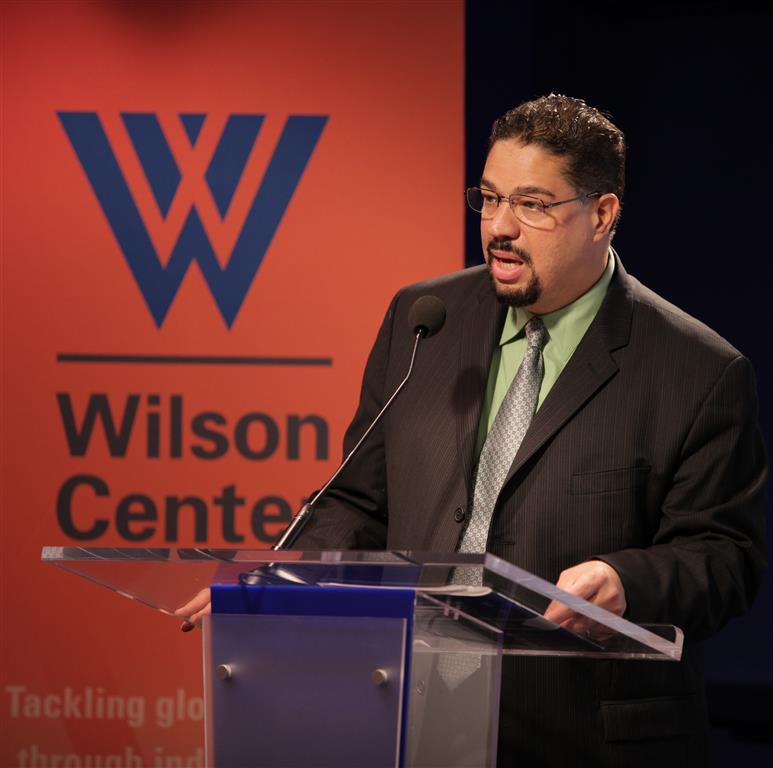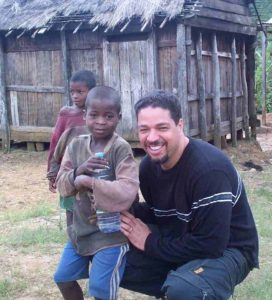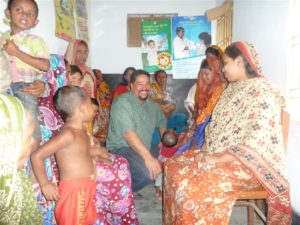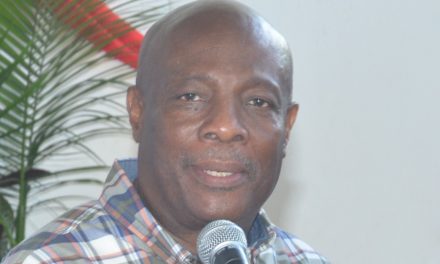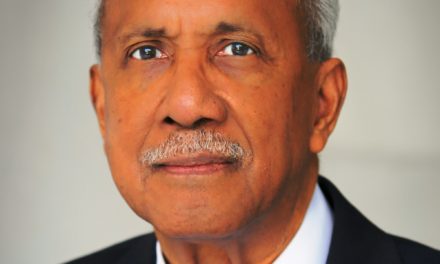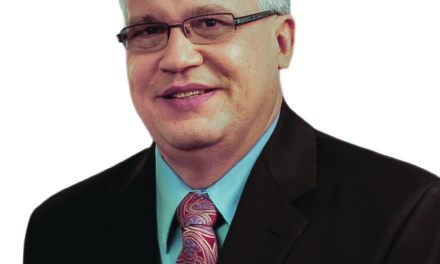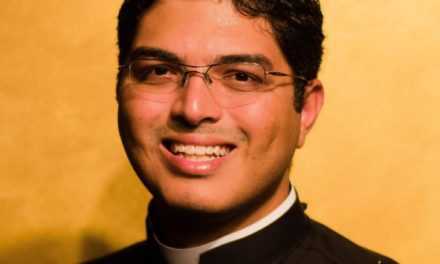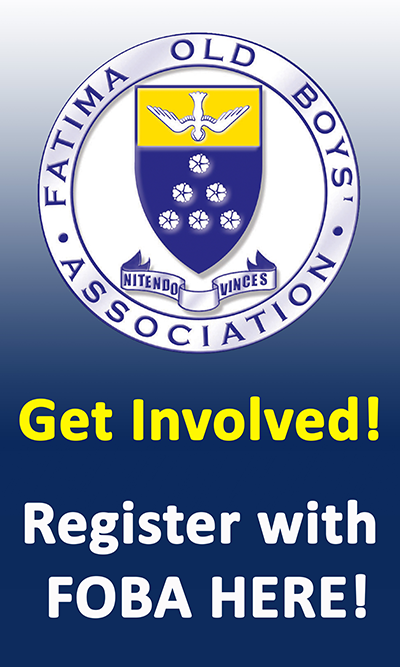- Views 2358
- Likes
Fatima College alumnus, Roger-Mark De Souza, is the Director of Population, Environmental Security, and Resilience at the Woodrow Wilson Center, Washington DC. He leads programs on climate change resilience, reproductive and maternal health, environmental security, and livelihoods, including the Center’s Global Sustainability and Resilience Program, Environmental Change and Security Program, and Maternal Health Initiative. He is certainly an exemplar of the great ideals of Fatima College and we thank him for taking the time to share a bit on his life.
Q: What year did you leave Fatima?
A: I left Fatima in 1986 after Form 6 (wow – it seems like just yesterday!)
Q: Describe the culture of the school during your tenure.
A: When I left Fatima it was a very exciting time. New and interesting talents had jointed the teaching staff – Ms. Hubbard came when I was in Form 1 and Ms. Cumberbatch when I was in Form 3. I remember their first days very well! Clive Pantin had retired and came back on Saturdays to give extra instruction in French and Spanish. The last breed of the Irish priests, Father Brett – who would always produce a handkerchief from his sleeve during class and whose classes always ended with stories about Mary Queen of Scotts – was winding down, and we had a new group of local priests joining the staff. Some of them had new and controversial approaches in the classroom (which I enjoyed). We had great teachers!
I served on the first Fatima yearbook committee with Mr. Joseph and was a member of the first AV club (started by Mr. Roach and others). Brian Lara was in Form 1. Ms. Heywood was our first female 6th Form dean. I served as a prefect and had cafeteria duty – which meant that I got a free lunch! We had a relatively new 6th Form wing. My mother ran the punch board at the MayFair with Ms. Roberts and my family was very engaged in Fatima sports and extracurricular activities. I was also lucky to be part of what I feel was an extraordinary cohort of boys – smart, engaging, mischievous, service oriented – many of them are still friends today. When we left Fatima, we were hopeful and excited, on the cusp of our future, we were Fatima boys shoulder to shoulder ever marching on….
Q: If you could go back in time, what would you change about your experience at Fatima?
A: Two things: better accountability and real life applications of academics. First, I would have liked more accountability for those teachers who were not performing. I had some excellent teachers, but I also had bad ones. They were unprepared, uninterested in the students as learners, and inappropriate on many levels. These cases were widely known- and for whatever reason, were not acted upon. Their bad example taught me a lot about what to not aspire to, failures within a system, and the importance of appropriate oversight. Second, I would have wished for more experiential, real world, hands-on, educational approaches. There was a significant gap in this regard and a lot of rote learning. I would have also wished that learning was more applicable – in terms of how I might be able to use what I was learning in my life and for a career.
Q: How has Fatima influenced your character and your career path?
A: While I was at Fatima I participated in a program working at Princess Elizabeth home for the handicapped and another program whereby we were helping students at Mucurapo Senior Comprehensive School with homework assignments and those experiences left strong impressions on me. I was reminded that as a Fatima Boy, I was lucky. I had had opportunities – and that I had a responsibility. It made me want to do more to help, and learn from, others. So my career in international development work finds its roots in those early experiences inculcated at Fatima – and in knowing how to engage others, and learn from them.
Q: Describe your work at the Woodrow Wilson Center.
A: I direct the Woodrow Wilson Center’s Global Sustainability and Resilience programs on Conflict Management and Mitigation; Population, Environment and Security; and Maternal Health. This entails administering programs in Africa, Southeast Asia and Latin America focusing on research, policy and communications, advising program managers, policymakers, researchers, and donors. The Center is affiliated with the Smithsonian Institute and was established by the U.S. Congress to serve as a living memorial to President Wilson in support of his beliefs in the importance of analysis, public service, practical policymaking and engagement with the world.
Q: “You can’t build a peaceful world on an empty stomach.” How credible is this statement?
A: This is a quote from Norman Borlaug, the father of last century’s Green Revolution. It was recently highlighted by the U.S. Secretary of State John Kerry at a high-level meeting on resilience and food security during the U.S.-Africa Summit in Washington D.C. I agree with this statement. It essentially emphasizes that you need a variety of approaches to meet people’s basic needs and to ensure that they are able to provide for themselves. But progress won’t be achieved through agricultural productivity and other supply-side gains alone.
We need management systems, good policies and good politicians. When national governance fails, as in Somalia, recurrent food scarcity and famine can become part of a vicious cycle of instability. In Somalia, as in other countries, food insecurity both results from and contributes to repeated rounds of armed conflict. We also need to buttress the agricultural sector so that it can respond to short term shocks such as floods or price volatility while providing a basis for long-term stability and economic growth.
Q: There seems to be an indirect relationship between the rate of population growth within a region and the state of development in that region. How true is this and why is it so?
A: The relationship between population dynamics and development priorities such as environmental preservation or poverty alleviation is not a simple linear equation, but instead a complex system of interrelationships. For example, rapid population growth tends to affect local resource scarcity first (e.g. deforestation, water and land use, fisheries), while consumption is the driver of many other types of environmental issues. So both population, consumption and how exactly something is produced (is it produced ethically, locally, efficiently?) are all important. It is also important to remember that in the parts of the world that are still growing rapidly, people are generally more reliant on their local natural resources than elsewhere.
Sub-Saharan Africa and parts of the Middle East and South Asia, where population growth is rapid, are disproportionately reliant on subsistence farming, which requires land and water, resources that can be quickly depleted by population growth. This creates unique vulnerabilities and is an impetus for addressing population and environment issues together. The interaction between rapid population growth and climate change is also crucial. For example, as more people move to coastal cities—Africa is now urbanizing faster than nearly anywhere else and island coastlines typically have high population concentrations—that may create pockets of vulnerability to things like sea-level rise, storm surge and extreme weather events.
Q: What have been the greatest challenges posed to the commercialization of renewable energy?
A: Renewable energy commercialization is still challenged by how to replace a fossil-fuel-based supply chain with one driven by alternative energy forms themselves. It is also important for renewable energy options to be supplied quickly, in the volume needed, and at a reasonable cost. We need a core set of early adopters to have enough market share to make it scalable.
Q: What is a ‘sustainable city’?
A: Sustainable cities are urban centers that manage the social, economic and environmental dimensions of urban planning for the long-term while taking advantage of the economies of scale that come with having concentrations of people, businesses, services, information and culture in one area. Increasingly sustainable city planning includes climate change adaption, crime prevention, the integration of new residents, and finding ways to capitalize on data collection and real-time monitoring in urban areas.
Q: Do you think that most of the criminal activity within Trinidad emerges from ‘unsustainable cities’? If so, what practical steps can be taken to improve these communities?
A: I’m not sure that criminal activity in Trinidad emerges from an unsustainable city per se. But the factors that you would find in resilient cities – including working judicial systems, civic engagement and collective action – are key elements that would lessen criminality. We found that in our work in Mexico, a variety of approaches—combatting organized crime, promoting judicial reform and promoting constructive societal responses to crime and violence, repairing damage in affected communities, and building trust between officials and communities—is making progress in reducing criminality.
Q: Can you see yourself returning to Trinidad to live in the future?
A: It is possible. My navel string bury in Trinidad. At the same time, I am the husband to a French woman and father to Franco-Trini American sons who are global citizens. Our Trinidadian identity is strong, vibrant and prominent and we are always happy to be in Trinidad.
Q: What is your proudest moment in Fatima?
A: I think that my proudest moment was those examples of working with students and young people at the Princess Elizabeth Home – and going to Mucurapo Senior Comprehensive to work with students there. The most memorable moment for me at Fatima, though, was when the administration streamed us in Form 3 – they put the brightest students in one class – and the rest of us were grouped alphabetically. I was not part of that “bright” class – and I excelled. I went from third to last in Form 1 to placing first in my class in Form 3. It came at a pivotal moment. It solidified my determination of what I wanted to study, and fortified my conviction that I could do it. It seems to me that the education system, just at an opportune moment, got it right for me. So I remember it not as a personal accomplishment, but as foresight and serendipity that brought these circumstances together for me at that moment in time.
Q: Your two sons obviously attended school in the US. Are there any valuable lessons that you learnt during your time at Fatima College which you think your boys may have missed out on?
A: Picong from teachers – and what it means. I remember once in my French class, Mr. Joseph asked a student what was French for rabbit, and the student replied, “Le Rabbit.” We were on the second floor on one of the classrooms near to the staff room. Mr. Joseph said to him, “You see that bannister – there, just go jump off it!” We all laughed, including the student, because we understood what he was saying: You need to take yourself seriously. We understood that. I sometimes wonder if in the United States, in a world of political correctness and over-litigation, whether we sometimes straightjacket young people out of human interactions that provide real moments of learning. My sons attended school in the US and in France, and as a father, I’ve passed this on to my boys as best as I can, but I would have valued an educational culture that reinforced this in memorable ways.
Q: Which one of your Fatima teachers deserves the most gratitude?
A: This was a group effort. They all have my gratitude – and for many reasons they deserve a lot of credit. Ms. Zakour created a lifelong love of French in Form 1 and Ms. Humphrey took it to another level in From 6. Mr. Romero got me through math. Ms. Heywood brought literature to life in a way that made me think, reflect and develop perspective – she helped me to see the world differently. – with wit, class, and humor. I think that I did the most growing up in her class – and still remember those intense sessions in the parlor pouring over Shakespeare and Chaucer- and what it all meant.
Q: Describe, if possible, a time in life where one door closed and another opened to something better.
A: Several years ago I was one of four finalists for a Rhodes scholarship. I was on a scholarship in France at the time and returned to Barbados for the interview. This was the time of pre-internet and I had no idea what the Rhodes scholarship was about. No one told me and I was probably too engrossed in my life in France to pay attention. I was totally unprepared for the interview, and I didn’t get it. Later when I learned of the prestige of the scholarship, I kicked myself. After graduate study at UWI, I ended up in the States for more graduate studies – it was there where I came to appreciate what I think was a university culture different from the British system – an exceptional culture of learning, shared scholarship, and intellectual humility.
Most recently I helped hire a Rhodes Scholar for a position similar to mine, and it brought back the memory of this experience. I see that the pathway was different, but the destination the same. Once you have the conviction, perspective, sense of self, and respect for greater powers at play, you learn to appreciate that it all works out as it should. So I don’t know that that door closing led to something better – but it led to something different. And that different thing was good and valuable. There are different paths to your destination – just find the one that works for you.
Q: Is failure truly a stepping stone to success?
A: I don’t know if failure leads to success – but I think that perspective does. I always laugh. I try not to take myself too seriously. I learn from those around me. I hug my sons. I listen to my wife. I walk my dogs. I surround myself with those who want to be with me. I cherish those friends who really know me and continue to be my friends. I try to remove the clutter and don’t listen to the noise around me. This helps me know my truth. So if I fail at something, I fail. I learn from it – that’s life.
Q: Is it challenging balancing your career and family life?
A: Very early in my career I had a life defining experience. My first son passed away after open heart surgery – he died in my arms. So early on, this experience grounded me and gave me some real perspective on life. I decided that I must love my work and I must work with people who appreciate that I will spend time with my family. I am lucky. I love working internationally. It takes me away from my family, but the best part is coming back to them. I enjoy my family. We laugh together. Every evening we eat dinner together. We like each other. So once you make this a priority and you enjoy it, you find ways to balance family and career.
Q: What is your ultimate goal in life?
A: That as adults, my sons look at their lives and upbringing and say that their mom and I did good. And that they pay it forward – that they become good husbands, fathers, and community members – that they are happy, productive, engaged and present in what’s going on around them.
Q: What’s next on your bucket list?
A: I’d love to go to India. And even though I don’t have direct Indian lineage, growing up in Trinidad I have a strong Indian heritage. I’d like to visit this country that has had an influence on my identity and persona.
Q: Any closing comments?
A: Thank you for these excellent questions!
Interviewer: Stefan Roach

